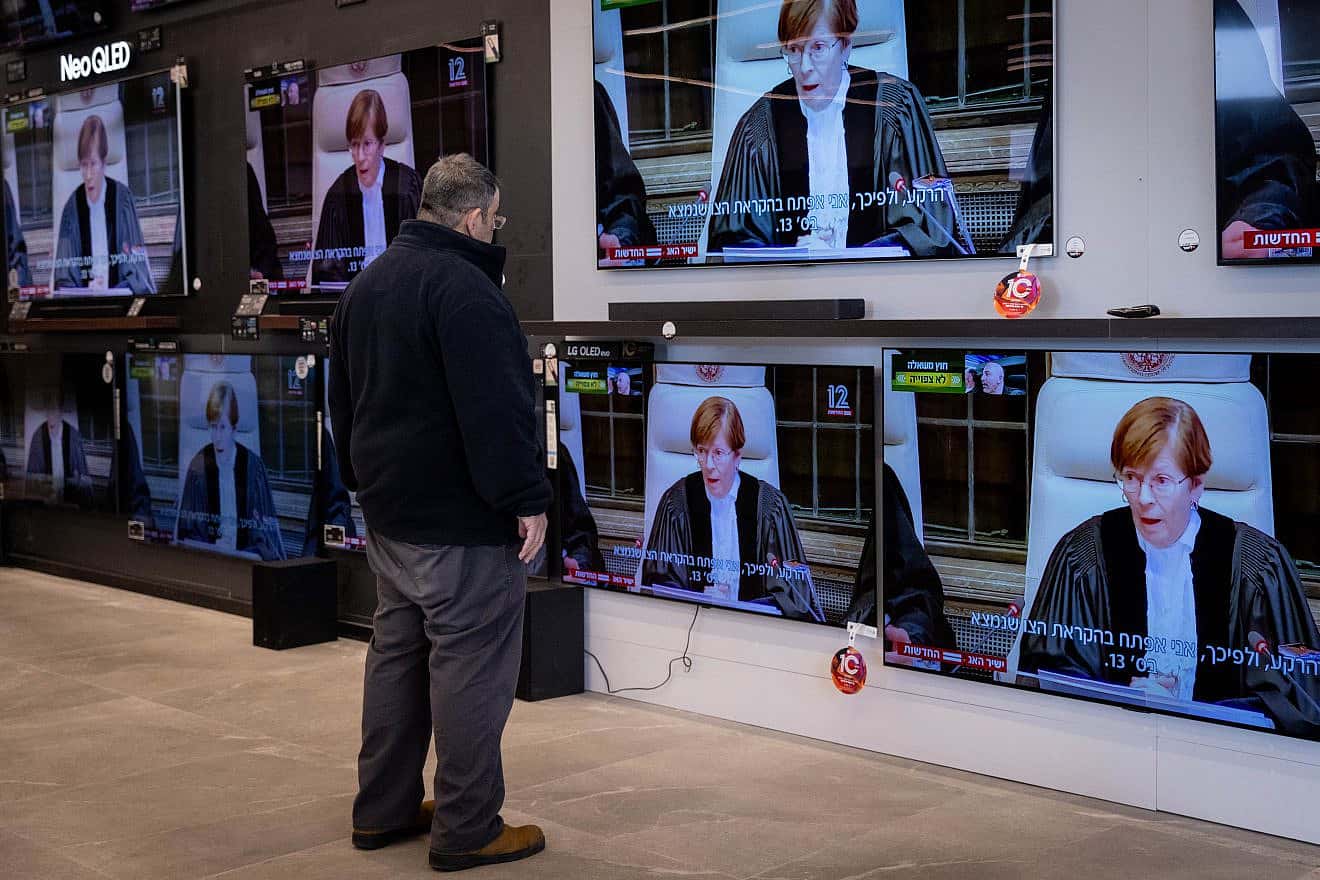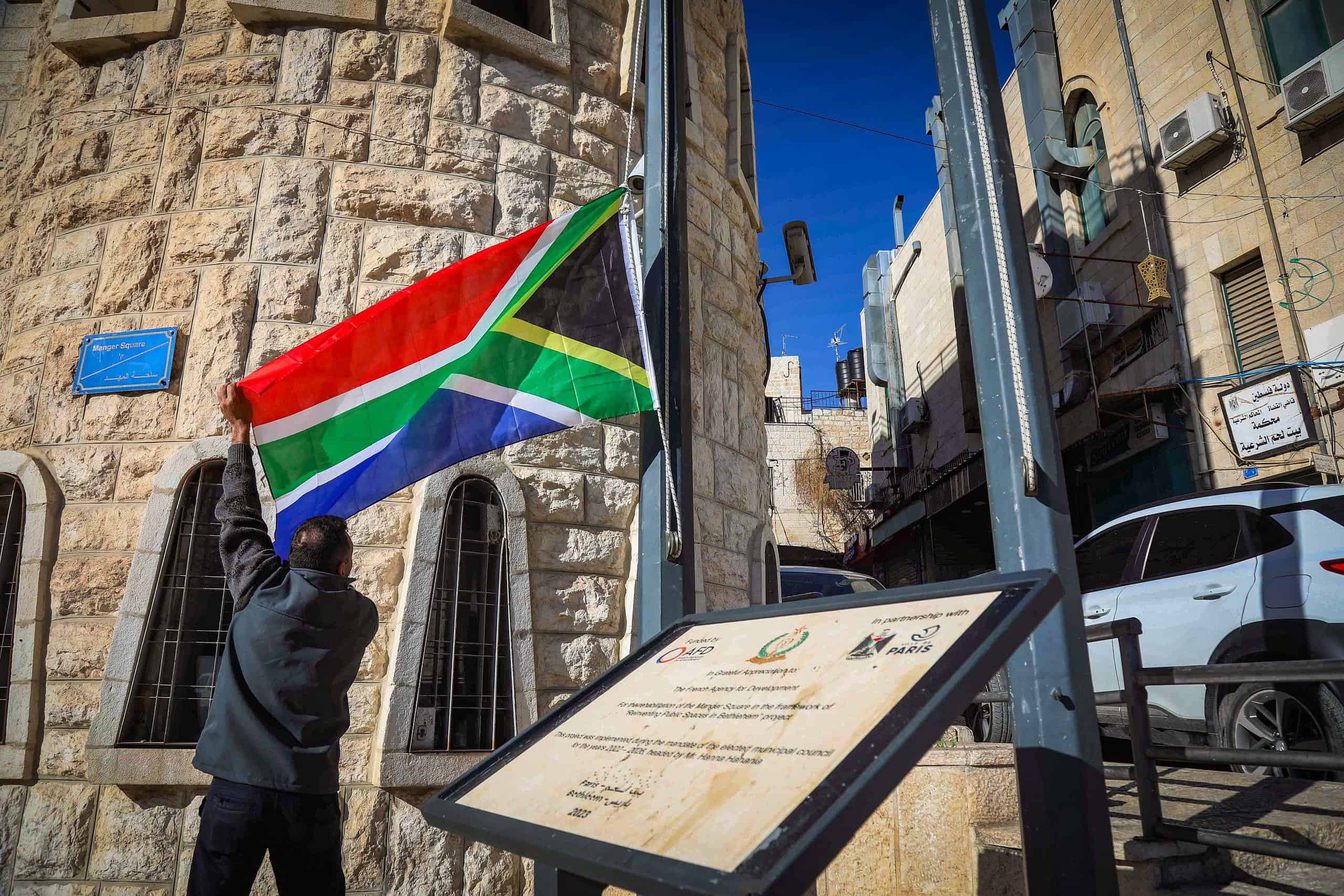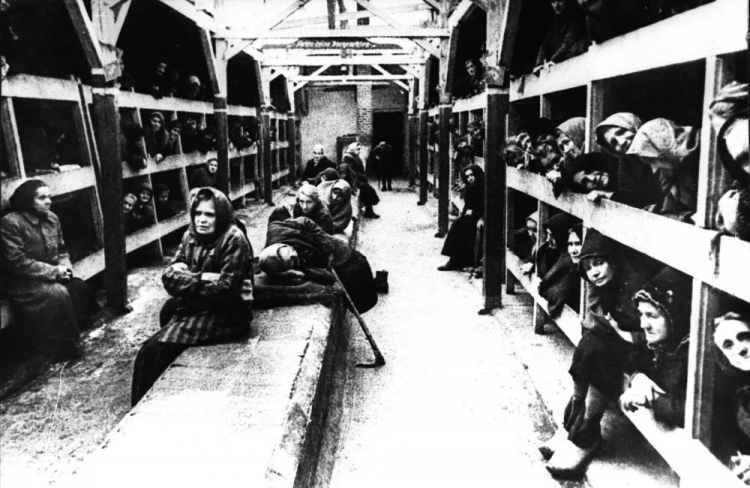JNS.org News*
Israel is provisional, with a final decision potentially coming in years.
.
 A man looks at television screens that are broadcasting a court hearing from the International Court of Justice in the law suit of South Africa against Israel, at a shop in Jerusalem on Jan. 26, 2024. Photo by Chaim Goldberg/Flash90.
A man looks at television screens that are broadcasting a court hearing from the International Court of Justice in the law suit of South Africa against Israel, at a shop in Jerusalem on Jan. 26, 2024. Photo by Chaim Goldberg/Flash90.
The International Court of Justice, the main judicial arm of the United Nations, rejected a request on Friday from South Africa to order a halt to Israel’s defensive war against Hamas in the Gaza Strip.
In its provisional ruling, the high court insisted that the Jewish state take all necessary means to prevent actions that could lead to genocide, and it dismissed South Africa’s demand that residents of the northern Gaza Strip be allowed to return to the area immediately.
A final decision from the court could take years. Friday’s ruling is binding according to international law, yet the court lacks an enforcement mechanism.
The court, which is based in The Hague, ordered Israel to “take all measures within its power” to prevent the commission of genocide against Palestinians in Gaza, to ensure that Israel Defense Forces troops do not commit acts of genocide and to punish alleged public incitement to genocide.
The ruling also called on Jerusalem to “take effective measures to preserve evidence” of military actions that might fall under the Convention on the Prevention and Punishment of the Crime of Genocide and submit a report to the court within a month.
Israel must also take “immediate and effective measures to enable the provision of urgently-needed, basic services and humanitarian assistance to address the adverse conditions of life faced by Palestinians” in the enclave, which is controlled by the Hamas terror group.
‘Mark of disgrace’
Israeli Prime Minister Benjamin Netanyahu said that the court “rightly rejected the outrageous demand to deny” Israel the right to defend itself against terrorism.
“The very claim that Israel is committing genocide against Palestinians is not just false, it is outrageous, and the court’s willingness to discuss it at all is a mark of disgrace that will not be erased for generations,” he added.
Netanyahu vowed to continue the war against Hamas until “absolute victory,” and until all 136 hostages are returned and Gazans no longer pose a threat to Israel.
Israeli Defense Minister Yoav Gallant stated that the court “went above and beyond when it granted South Africa’s antisemitic request to discuss the claim of genocide in Gaza, and now refuses to reject the petition outright.”
“The State of Israel does not need to be lectured on morality in order to distinguish between terrorists and the civilian population in Gaza,” Gallant said. “Those who seek justice, will not find it on the leather chairs of the court chambers in The Hague. They will find it in the Hamas tunnels in Gaza, where 136 hostages are held, and where those who murdered our children are hiding.”
‘Grossly unfounded case’
Israel “narrowly escaped diplomatic disaster in The Hague, but a dangerous precedent was set,” wrote Eugene Kontorovich, a law professor at George Mason University and director of its Center for the Middle East and International Law. “The court gave itself authority into supervise the conduct of democratic countries’ wars, under the pretext of looking for genocide.”
The court “will surely be used in the future to cause diplomatic harm to Israel,” Kontorovich added. “Israel should immediately follow America’s lead and quit the court’s jurisdiction.”
The international court can adjudicate cases between states, either with the defendant state’s explicit permission or by prior international agreement or formal notification to the court.
The basis for this trial is the Convention on the Prevention and Punishment of the Crime of Genocide, established in 1948 in response to the crimes of the Holocaust and signed by Israel and South Africa. Genocide refers to the intentional destruction “in whole or in part” of “a national, ethnical, racial or religious group,” per the convention.
Israel is the fifth country to face the charge of genocide at the International Court of Justice.
Israel has been at war with Hamas since the terrorist group invaded the northwestern Negev on Oct. 7, murdering 1,200 people, wounding thousands more and kidnapping more than 240. Israel’s stated military goals are to destroy Hamas as a political and military entity in Gaza, free the hostages and ensure that Gazans can never again threaten Israel.
Israeli Prime Minister Benjamin Netanyahu reportedly met on Thursday with senior legal officials and government ministers to prepare for the ruling. Among those attending was legal adviser to the government Gali Baharav-Miara, Justice Minister Yariv Levin, Strategic Affairs Minister Ron Dermer and National Security Council head Tzachi Hanegbi.
John Kirby, coordinator for strategic communications at the National Security Council of the White House, said on Jan. 3 that South Africa’s charge of genocide against Israel is “meritless, counterproductive, completely without any basis whatsoever.”
On Tuesday, 210 members of the U.S. Congress penned an open letter to U.S. Secretary of State Antony Blinken condemning South Africa for filing “a grossly unfounded case against Israel at the International Court of Justice.”
“South Africa’s accusation of genocide against Israel exposes how far Israel’s enemies will go in their attempts to demonize the Jewish state,” the congressmen wrote.
While South Africa barely acknowledged the Hamas terrorists, “who gleefully massacred, mutilated, raped and kidnapped innocent civilians” on Oct. 7, it made “grossly unfounded and defamatory charges against Israel on the world stage,” the U.S. lawmakers added.
International Christian Embassy Jerusalem expressed its “utter dismay” at the court’s ruling, which it said “only compounds the shock and pain” of Hamas’s Oct. 7 terror attack.
“That the wide majority of justices on the court would sit calmly at the reading of its rulings on the eve of Jan. 27, set aside by the international community as International Holocaust Remembrance Day, only deepens our disappointment at the world’s betrayal of the Jewish state and people,” the embassy stated. “This decision inverts justice and is built on decades of the United Nations and all its forums becoming the world’s most cunning purveyors of antisemitism.”
“These global institutions were founded with honorable intentions, including to prevent a repeat of the Nazi genocide against the Jews, yet these very forums are now placing Israel in grave danger by giving credence to these outrageous claims it is committing genocide in Gaza,” it added.
“Today’s determinations by the ICJ, including wholesale dismissal of the atrocities inflicted by Hamas, its failure to consider the compelling evidence put forward by Israel and their reliance on the United Nations, including the discredited UNRWA and UNHRC bodies, must bring into question the court’s lack of impartiality and credibility,” according to Arsen Ostrovsky, a human rights attorney and CEO of the International Legal Forum.
“Although it should be underscored that the ICJ decision to grant provisional measures did not make any determination as to the substance of South Africa’s allegations, nor did it order a ceasefire or compel Israel to stop its military operations, it may now create a dangerous precedent,” Ostrovsky told JNS. “Such low threshold, whereby any state can initiate baseless and politicized proceedings, seeking to constrain the ability of democracies, such as Israel, to fight jihadist terror.”
“It should also not go unnoticed that this decision has been handed down on the eve of International Holocaust Remembrance Day,” he added. “The very term ‘genocide’ was created in the wake of the Holocaust, to describe the attempted annihilation of the Jewish people, and is now being unconscionably weaponized and subverted by South Africa, in the wake of the single largest massacre of Jews, since the Holocaust itself.”
‘Out of context’
In late December, South Africa submitted the 84-page charge to the Hague court in which it formally accused Israel of genocide. The South African legal team is headed by John Dugard, who chaired a U.N. Commission of Human Rights inquiry committee and who has said Israel is an apartheid state and called for an arms embargo on Israel.
“Israel has transgressed article two of the convention, committing acts that fall within the definition of genocide,” attorney Adila Hassim claimed during arguments on Jan. 11.
The South African delegation also claimed that the establishment of the State of Israel was tantamount to genocide.
“The violence and the destruction in Palestine and Israel did not begin on Oct. 7, 2023. The Palestinians have experienced systematic oppression and violence for the last 76 years,” South African Justice Minister Ronald Lamola told the court.
In an attempt to establish intent, the South African delegation brought a series of quotes from Israeli personalities, spanning from the prime minister and defense minister to soldiers fighting in Gaza and even an Israeli singer.
 Bethlehem Municipality employees raise a South African flag as a sign of appreciation for its lawsuit against Israel to the International Court of Justice, in the West Bank city of Bethlehem on Jan. 16, 2024. Photo by Wisam Hashlamoun/Flash90.
Bethlehem Municipality employees raise a South African flag as a sign of appreciation for its lawsuit against Israel to the International Court of Justice, in the West Bank city of Bethlehem on Jan. 16, 2024. Photo by Wisam Hashlamoun/Flash90.
‘Quotes taken out of context’
In one piece of alleged evidence, South Africa showed Netanyahu citing the biblical commandment to “wipe out the seed of Amalek,” a tribe described in the Torah that mercilessly, persistently and opportunistically attacks the Jews.
In another claim, South Africa purported to show Israeli soldiers celebrating as they blew up a part of the Shejaia neighborhood in Gaza City.
Avraham Shalev, an adviser and specialist in public law at the Kohelet Policy Forum, told JNS that “the quotes of anyone who isn’t directly involved with the decision-making process of the war are not relevant for establishing intent.”
“Many of these quotes were taken out of context,” Shalev said of the quotations that South Africa cited from members of the Israeli war cabinet. He noted that Israel’s accusers claimed that Gallant’s statement that Israel is “fighting human animals” was “genocidal, but it is clear he was talking about Hamas fighters.”
South Africa continued to charge what it called “acts of genocide.”
The delegation mostly referenced statistics about the scale of the destruction throughout the Gaza Strip and alleged that the scale of destruction of property and loss of civilian lives demonstrates a purposeful attempt by the IDF to destroy the Palestinians living in the Strip.
The six-person Israeli delegation, headed by British law professor and leading international law expert Malcolm Shaw, argued before the court on Jan. 12. It argued that the conflict in Gaza cannot be discussed outside the context of the Oct. 7 attacks.
Israeli attorney Tal Becker described some of the atrocities committed on Black Saturday “not because these acts, however sadistic and systematic, release Israel of its obligations to uphold the law as it defends its citizens and territory, but because it is impossible to understand the armed conflict in Gaza without appreciating the nature of the threat that Israel is facing and the brutality and lawlessness of the armed force confronting it.”
Becker accused South Africa of purposefully misrepresenting the conflict. “The events of that day are all but ignored in the applicant’s submissions,” Becker said. He added that the events of Oct. 7 established a legal basis for Israel to declare war and pursue legitimate enemy targets.
On the subject of intent, the Israel delegation strongly opposed South Africa’s description of Israeli policy as targeting civilians.
“Israel’s lawful aims in Gaza have been clearly and repeatedly articulated by its prime minister, its defense minister and all members of the War Cabinet,” Israel said. Its legal team also cited the official IDF directive to soldiers to “distinguish between combatants and civilians.”
The team concluded that Israel’s persistent efforts to protect civilians, by dropping leaflets with orders to evacuate, by securing humanitarian corridors in Gaza and by providing humanitarian aid shows a clear lack of intent to commit genocide.
“To produce random quotes which are not in conformity with government policy is misleading at best,” Shaw said.
Israel argued further that the “acts of genocide” that South Africa alleges are legitimate acts of war. Becker accused South Africa of ignoring the ongoing military conflict in Gaza and painting the situation only as a series of Israeli actions against an unarmed population.
“In the applicant’s telling, it is almost as if there is no intensive armed conflict taking place between two parties at all, no grave threat to Israel and its citizens, only an Israeli assault on Gaza,” he said.
Shaw also argued that the reality of the ongoing conflict in Gaza and Hamas’s consistent use of civilian installations to launch its attacks renders the term “genocide” inapplicable.
Civilians suffer in all armed conflicts, “especially when a side attacks civilians and is unconcerned” by the welfare of civilians on its side, he said.
“Not every conflict is genocidal. The crime of genocide in international law and under the Genocide Convention is a uniquely malicious manifestation and stands alone among violations of international law as the zenith of evil, the crime of crimes, ultimate in wickedness,” he added.
The Israeli team argued that the court interceding in the ongoing war would remove Israel’s right and ability to defend itself.
 Niemiecki nazistowski obóz koncentracyjny Auschwitz po wyzwoleniu przez Armię Czerwoną. Fot. PAP/CAF/Reprodukcja
Niemiecki nazistowski obóz koncentracyjny Auschwitz po wyzwoleniu przez Armię Czerwoną. Fot. PAP/CAF/Reprodukcja 79 lat temu Armia Czerwona otworzyła bramy obozu Auschwitz
79 lat temu Armia Czerwona otworzyła bramy obozu Auschwitz



